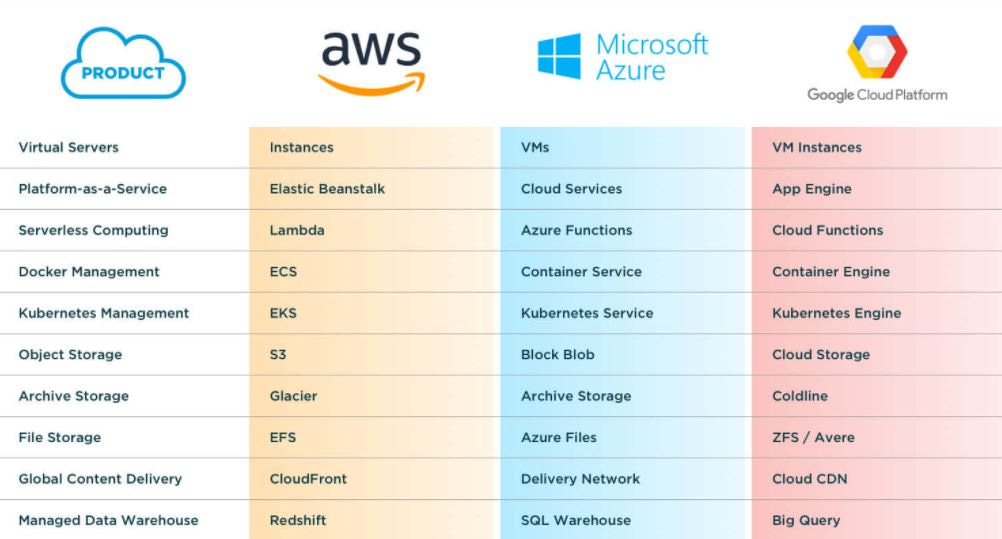Learning The Cloud = Good Salary - That's a fact.
Will this trend last forever?
Will AI "take our jobs"?
Will high school students learning about AWS devalue the entire market? Perhaps...
However, as of 2024, learning the cloud equates to a good salary. The question is, which one should you learn?
What are your choices?
Amazon Web Services (AWS)
Microsoft Azure
Google Cloud Platform (GCP)
Linode (Akamai)
IBM Cloud
Oracle Cloud
That's not all of them, just the most popular ones.
Tencent Cloud and DigitalOcean are among a ton of others that offer cloud solutions, or you could even build your own! More about that another time though.
I could spend all day discussing the differences among the various cloud providers. For the sake of time, I'm going to focus on AWS and Azure—the two top dogs.
Let's get into it...
Differences:
Market Share
Why is market share important?
Well, it's a decent indicator of the future value of learning a cloud provider.
Why? Because more market share means more companies are adopting the cloud provider's technology, which in turn leads to more jobs. It's that simple. Take Google Cloud Platform (GCP) for example - they hold 10% market share and while I fully endorse learning multi-cloud architecture, you might say that dedicating yourself solely to GCP could make it harder to find a job. That's not gospel, but it certainly holds some truth. At the end of the day, it's a numbers game, and you can increase your own odds of employment, career safety, and growth by learning more than one.
Current standing 2024:
AWS: 31%
Azure: 24%
Regional Jobs
I'm in the UK, where Azure is king. However, if you're in the States, AWS has the throne. I'm not saying that learning AWS in the UK is a waste; in fact, I predominantly work with AWS myself. However, it's worth checking what most Cloud Engineer/Security jobs are looking for in your area and working backwards from there.
Names
Same technology, different names.
Taking AWS, Azure and GCP into consideration here, the underlying services are often the same, but they have different naming conventions.
Let's look at a sample example:

Pros and Cons
Cost
AWS is better for larger workloads and Azure is more suited for smaller workloads. You might instantly think, okay well I’m learning so I naturally be using less compute. However, think about what a business might look like. AWS and Azure have different pricing models. Both typically offer a pay-as-you-go model, where you pay for the resources you consume.
Documentation
The AWS Whitepapers win here hands down. I understand that Microsoft are leaning heavily on AI to make Azure Documentations more accessible, however, that has happened yet. The AWS Whitepapers, are well written and extremely extensive.
Services
Both AWS and Azure offer a vast array of services, including compute, storage, networking, databases, machine learning, and more. AWS boasts a broader and more mature service portfolio with over 200 services, while Azure provides around 100+ services but has a strong focus on integration with Microsoft products and services.
Security and Compliance
Security is a top priority for both AWS and Azure, and they both offer healthy security features, including identity management, encryption, and compliance certifications. AWS has a slight edge with its AWS Identity and Access Management (IAM) and AWS Shield for DDoS protection. Azure, however, leverages Azure’s Active Directory and Azure Security Center for enhanced security. I’m not saying IAM is better than AD here - just more mature and feature full.
Employment
Completely Geo Dependent.
Learning
Both AWS and Azure have large and active communities of developers, architects, and IT professionals. AWS has a more extensive community due to its longer presence in the market, but Azure's community is growing rapidly, especially among enterprise users. Honestly this one is down to personal preference. I’ve heard it from other seasoned cloud professionals that AWS is much easier to learn simply because more resources, labs and tutorials exist. Your experience may be different though.
Which should you learn?
It literally doesn't matter, for the most part.
Two outcomes exist here: You pick one, lose interest, and move on to something else. Seriously, that's okay. This career isn't for everyone. Yes, the salaries are high, but don't force yourself to learn something you actively find boring.
Or you pick one, learn it, and then naturally pick up skills with the other. Seriously, the last thing you want here is analysis paralysis.
My opinion: learn AWS. Why? Right now, it's bigger and has more services. Simple.
Thank you for reading: Keep it secure, keep it light-hearted!
WJPearce - CyberBrew
Enjoyed this? Why not check out my other reads…
The Top Five Kali Linux Tools 🐉
Cyber Careers: The Guide You Need 💼


